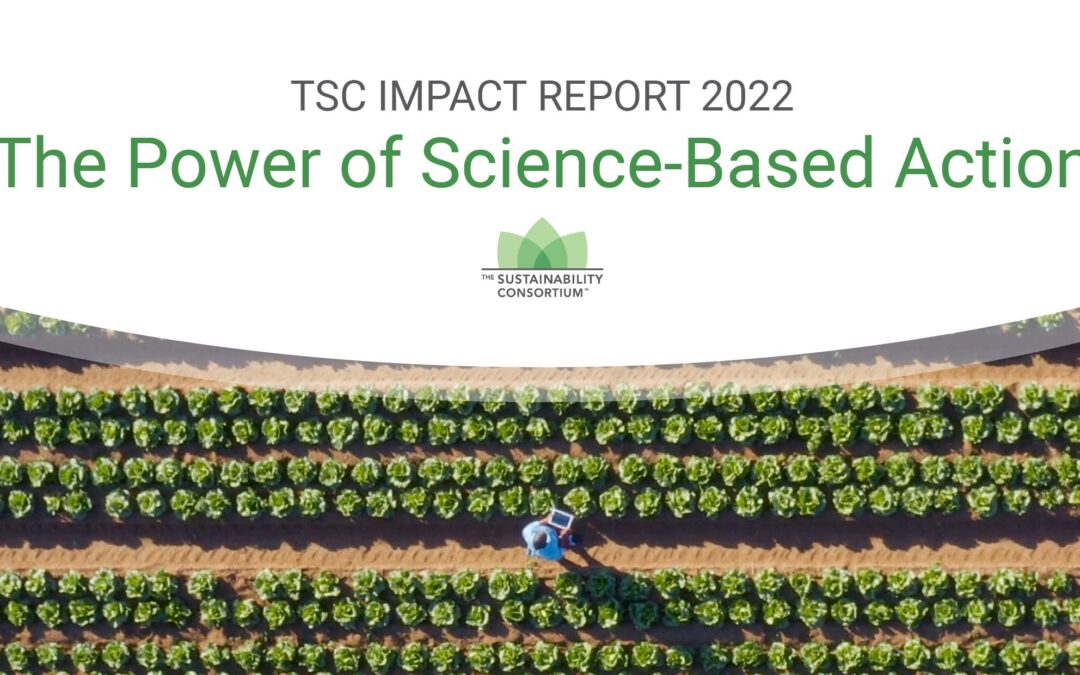Tempe, AZ, Fayetteville, AR, November 3, 2022 – The Sustainability Consortium (TSC) reported today that between 2016 to 2021, The Sustainability Insight System (THESIS) assessments of product manufacturers have improved 48% overall. This is an indication that the systems and processes put in place to respond to 600+ THESIS product category assessments are creating positive changes in manufacturers’ practices and supply chains, leading to an overall improvement in scores. THESIS, powered by SupplyShift, is currently used by 12 retailers that include Ahold Delhaize USA Brands, Costco, Sam’s Club, Staples Inc., Tractor Supply Company, Wakefern Food Corporation, Walgreens USA, Walgreens Boots Alliance, Walmart, and Woolworths Group Limited.
In 2021, TSC found the following insights on consumer goods sustainability performance
- Over 1,500 companies have adopted science-based targets for greenhouse gas emission reductions
- Science-based targets (SBTs), and the accompanying accreditation by SBTI, are leading companies to adopt and put in place emissions goals that if collectively implemented will keep global warming to 1.5 or 2.0 degrees centigrade.
- Companies that had SBTs scored significantly better (10%) on THESIS overall than those without SBTs.
- On greenhouse gases specifically, companies with SBTs scored in THESIS on average 80 (out of 100) whereas those without SBTs score on average 53 indicating that commitments may be driving performance.
- SMEs (small-to-medium enterprises) perform at the same level on sustainability as companies of different revenue sizes
- Regardless of SBTs, out of 820 supplier samples on THESIS, there was a 16% average decrease in manufacturing GHG emissions between 2019-2021, and 146 of these suppliers reported reductions across all three years
- Companies reporting supply chain (scope 3) GHG disclosures to THESIS between 2019-2021, increased from 61% to 67% of supply chains disclosing.
In 2022, TSC welcomed new Chief Executive Officer, Dr. Christy Slay, whose focus for TSC centers around driving TSC and its members to move towards more sustainable consumer goods supply chains with a greater sense of urgency and true impact.
Dr. Slay states, “The time has come to utilize harmonized metrics and systems like THESIS to address the world’s most pressing issues, moving beyond pilots and measurement for measurement’s sake. We can no longer simply pass sustainability decisions on to the consumer to figure out themselves via labels and product-level initiatives. We must move faster and at collective and harmonized scale.”
In their 2022 Impact Report, The Power of Science-Based Action, TSC details the reasons behind some of the uptick of both retailers and suppliers making science-based commitments to sustainability.
Dr. Kevin Dooley, TSC’s Chief Scientist and distinguished faculty at Arizona State University (ASU), says, “TSC stakeholders agree on two core beliefs: that collective action creates significant positive change, and that science should be the arbiter of our discussions and decisions. TSC’s anchoring on scientific evidence leads to the collaborative innovation we are seeing happening right now.”
This updated impact report also highlights progress in TSC’s work on commodity mapping, resilient agriculture, responsible pest management, small format circularity, circular plastic packaging, and research around animal feed.
TSC translates the best sustainability science into business tools that are used all over the world to create more sustainable consumer products. Their full impact report is available here.
About TSC
The Sustainability Consortium (TSC) is a global non-profit organization transforming the consumer goods industry to deliver more sustainable consumer products. We work to enable a world where people can lead fulfilled lives in a way that decouples their impacts on people and the planet. Our members and partners include manufacturers, retailers, suppliers, service providers, NGOs, civil society organizations, governmental agencies and academics. TSC convenes our diverse stakeholders to work collaboratively to build science-based decision tools and solutions that address sustainability issues that are materially important throughout a product’s supply chain and lifecycle. TSC also offers a portfolio of services to help drive effective improvement and implementation. Formed in 2009, TSC is jointly administered by Arizona State University and the University of Arkansas and has a European office at Wageningen University and Research in the Netherlands. For more information visit www.sustainabilityconsortium.org.
Press inquiries contact:
Erika Ferrin
480-965-7752

